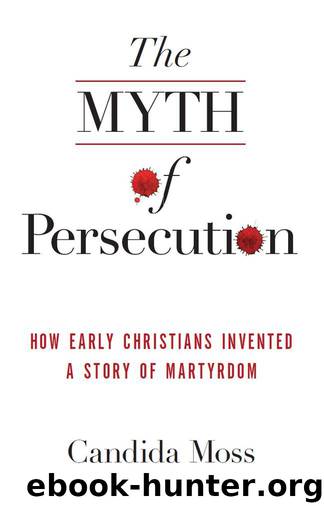The Myth of Persecution: How Early Christians Invented a Story of Martyrdom by Moss Candida

Author:Moss, Candida [Moss, Candida]
Language: eng
Format: mobi, epub
Publisher: HarperCollins
Published: 2013-03-04T16:00:00+00:00
THERE’S NO DOUBT THAT Christians thought they were persecuted; they ruminate on it, theologize about it, bewail, lament, protest, and complain. Nor should we underestimate the reality of their experiences. There is no doubt that Christians did die, that they were horrifically tortured and executed in ways that would appall people today, however uninterested they are in human rights. We can imagine that for a small community the death of even a single member would have had a devastating effect on the group and left a lasting imprint on the ways in which they thought about themselves. We do not need to conclude that the authors of Revelation and 1 Peter are hysterical when they complain about being persecuted, but their experiences do not line up with either the mythology of Christian persecution or modern definitions of persecution in which persecution is centralized and state-led.
At the same time, the statements of apologists like Justin Martyr, Tertullian, and Eusebius do not fit with the evidence. We need to be wary of the claims of Christians that they were everywhere and always persecuted, when, in fact, they were not. Even if we do not agree that persecution must necessarily be imperially initiated, there needs to be greater subtlety in the way we describe the experiences of early Christians. There is something different about the experiences of a Christian after the implementation of Diocletian’s fourth edict, a Christian who dies as the result of mob violence or impudence, and a Christian unable to hold public office. It is important to use language that reflects these different circumstances, because the failure to do so has contributed to the misconception that Christians were always and everywhere under attack. As clouded and difficult as this question is, one thing is clear: Christians were not the victims of sustained and continual persecution by the Romans on either an imperial or provincial level. They were very rarely the victims of imperial persecution, and we cannot always be sure that this persecution was directed against Christians. The Roman emperors and even some governors seem largely uninterested in Christians. Although they found Christians irritating, it appears that many, if not most, administrators were willing to turn a blind eye to their existence.
Even in those few cases when legislation demanded that Christians sacrifice publicly to the gods, it’s difficult to tell what kind of structures were in place for tracking down those who were noncom-pliant. During the Decian “persecution,” Christians could have been called to account for failing to produce a certificate of participation in the imperial cult. It’s just not clear how often that happened. In the case of the fourth edict of the Diocletian persecution, roll calls of citizens were apparently taken in order to check who had and had not sacrificed. But this happened only in select regions and for a very short period of time. It was really only after Diocletian’s fourth edict in 304, only in select regions in the empire, and presumably only until his retirement in 305 that we find the kind of situation assumed by the myth of Christian persecution.
Download
The Myth of Persecution: How Early Christians Invented a Story of Martyrdom by Moss Candida.epub
This site does not store any files on its server. We only index and link to content provided by other sites. Please contact the content providers to delete copyright contents if any and email us, we'll remove relevant links or contents immediately.
| Buddhism | Christianity |
| Ethnic & Tribal | General |
| Hinduism | Islam |
| Judaism | New Age, Mythology & Occult |
| Religion, Politics & State |
Cecilia; Or, Memoirs of an Heiress — Volume 1 by Fanny Burney(31341)
Cecilia; Or, Memoirs of an Heiress — Volume 3 by Fanny Burney(30938)
Cecilia; Or, Memoirs of an Heiress — Volume 2 by Fanny Burney(30894)
The Secret History by Donna Tartt(16643)
Sapiens: A Brief History of Humankind by Yuval Noah Harari(13067)
Leonardo da Vinci by Walter Isaacson(11912)
The Radium Girls by Kate Moore(10914)
Sapiens by Yuval Noah Harari(4546)
The Wind in My Hair by Masih Alinejad(4427)
How Democracies Die by Steven Levitsky & Daniel Ziblatt(4407)
Homo Deus: A Brief History of Tomorrow by Yuval Noah Harari(4287)
Endurance: Shackleton's Incredible Voyage by Alfred Lansing(3852)
The Silk Roads by Peter Frankopan(3769)
Man's Search for Meaning by Viktor Frankl(3644)
Millionaire: The Philanderer, Gambler, and Duelist Who Invented Modern Finance by Janet Gleeson(3574)
The Rape of Nanking by Iris Chang(3522)
Hitler in Los Angeles by Steven J. Ross(3443)
The Motorcycle Diaries by Ernesto Che Guevara(3340)
Joan of Arc by Mary Gordon(3262)
